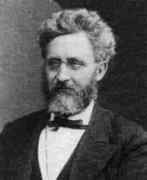Person: Bjerknes, Carl

Carl Bjerknes was a Norwegian mathematician and physicist who worked in pure mathematics as well as hydrodynamics.
Mathematical Profile (Excerpt):
- In 1844 Bjerknes entered the University of Christiania (now Oslo), where he studied mining.
- The oldest school of mines in the world, founded 1757, was in the town and Bjerknes worked there from 1848 until 1852.
- For two years, from 1852 to 1854, Bjerknes taught mathematics in a school but an award of a scholarship enabled him to study mathematics at Göttingen and Paris in 1856-57.
- Dirichlet lectured to Carl Bjerknes in Göttingen on hydrodynamics and Bjerknes became so interested in that topic that he spent the rest of his life researching in that area.
- They had two other sons, Carl who became a sailor and died in a tropical cyclone, and Ernst who became an engineer.
- In particular one of their grandsons Jacob Bjerknes, Vilhelm Bjerknes's son, also achieved great fame as a scientist.
- Despite the difficulties under which he worked, Bjerknes produced outstanding results and was promoted to Professor of Applied Mathematics at the University of Christiania in 1866.
- Let us examine a little this work which assumed such a dominant role in Bjerknes' life.
- Bjerknes discovered analogies between the way bodies could move through a frictionless fluid and certain electromagnetic effects.
- The treatise was entitled Hydrodynamic action at a distance according to C A Bjerknes's theory.
Born 24 October 1825, Christiania (now Oslo), Norway. Died 20 March 1903, Kristiania (now Oslo), Norway.
View full biography at MacTutor
Tags relevant for this person:
Origin Norway
Thank you to the contributors under CC BY-SA 4.0! 

- Github:
-

- non-Github:
- @J-J-O'Connor
- @E-F-Robertson
References
Adapted from other CC BY-SA 4.0 Sources:
- O’Connor, John J; Robertson, Edmund F: MacTutor History of Mathematics Archive
